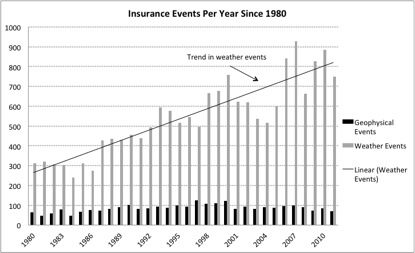Russel Norman was slated earlier this week for pointing out that the dreadful typhoon that struck the Philippines was no act of God but a direct result of our carbon emissions. Meanwhile John Key is cosying up with a Christian climate change denier in the run up to the next election. The political divide is turning into a religious one – did I hear you say, “God help us”?
Of course, climate change doesn’t cause any particular natural disaster. We have always had natural disasters, which are a result of all manner of factors coming together. However, the fact is that a warmer climate, and particularly a warmer ocean, will increase the frequency and strength of certain natural events.
It is no coincidence that this year has been a bizarre one for climate phenomena. New Zealand had its worst drought since 1945, but since then milk production has rebounded with one of the mildest winters in memory. Funny how you don’t hear much from the farmers when times are good, they are too busy borrowing more for a bigger farm and the tax-free returns from capital gains. But if you can’t remember the storms that peppered our mild winter, just pay a visit to Wellington’s Island Bay where the seawall is still breached.
Of course any one year’s freaky weather events could just be an outlier. The telling statistics with climate change are what happen over the longer term. Below is a graph we produced in Ice, Mice and Men, our book on Antarctica and the subantarctic islands, which included a section on climate change. It shows insurance events back to 1980. You can see that geophysical events like earthquakes have been flat, but weather events are on a long, slow rise. Insurance companies are worried, and rightly so.

Russel Norman wasn’t scoring political points by pointing out this simple fact. Disasters are on the rise, and will continue to do so. In fact, this is the real reason for taking action on climate change, and the Greens would do well to shift their rhetoric accordingly. It is not about saving the world, or levitating to some higher ethical reverie. It is about preparing for something far more mundane – our economic and general well-being.
From a pragmatic position these climate disasters will continue to become more frequent and severe. It is only a matter of time before US and China face public pressure to do a deal on climate change. This may take another decade or even two, but it will happen; you only need to look at that upward line. Once they act, the world will follow. We need to make investments now to be ready for this change, without penalising our industries in the mean time. We want our industry to be in the best possible place when worldwide carbon policies come into play.
Perhaps the most stunning political move of the past week was the news that John Key is open to entering coalition conversations with an open climate change denier. Apparently Colin Craig thinks that his opinion is worth more than scientific consensus. He points out that other factors influence climate, but shies away from the wealth of data that shows that the human influence is likely to be the largest.
The fact that he is a Christian comes as no surprise. There is nothing like blind faith to help one sleep at night when one’s beliefs are counter to the vast bulk of evidence. He will no doubt blame the increase in disasters we are seeing on gay marriage, or the fact that parents can’t smack their kids. Does John Key have no moral bottom line?

